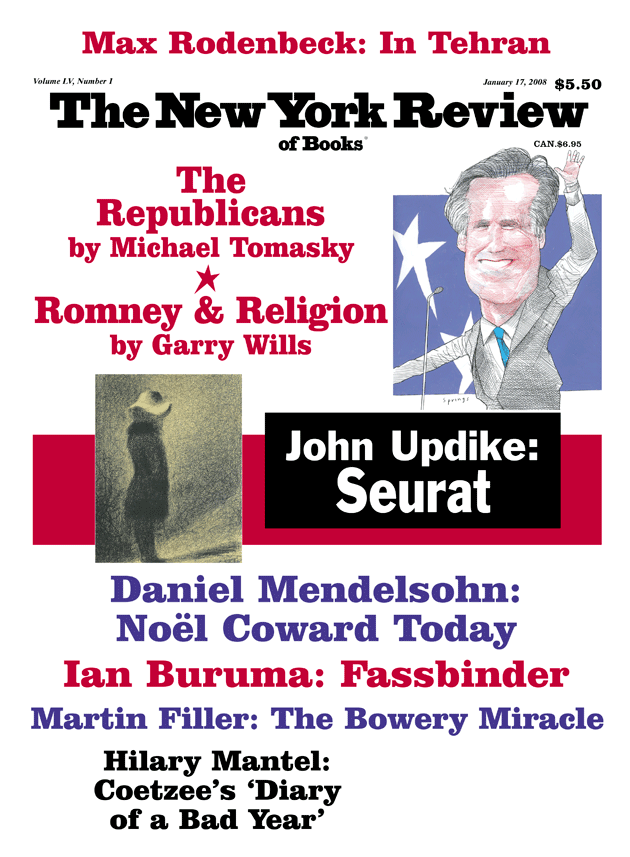In response to:
The Wrecking Ball of Innovation from the December 6, 2007 issue
To the Editors:
There is considerable irony in Tony Judt’s use of my book for his jeremiad against modern capitalism [“The Wrecking Ball of Innovation,” NYR, December 6, 2007]. While I share his concerns about its consequences as well as his desire for a more robust expression of the common good, my central point is that such screeds won’t help. Vilifying global corporations, international executives, and the very rich may be emotionally gratifying but they’re the wrong targets. Denigrating economic growth, productivity, and the global market may be rhetorically satisfying but this can lead to nativism, protectionism, and brainless neo-Ludditism.
I think it better to acknowledge the natural desire of human beings to improve their material condition, but to understand how easily today’s consumers seeking great deals in this hyper-competitive economy inadvertently trump their concerns as citizens who value the common good. This is happening not only in the United States but across Europe and Asia. Fierce competition for consumer dollars is pushing companies to slash payrolls, outsource abroad, fight unions, violate human rights, and spew gunk into the atmosphere, among other things. In America, that same competition has unleashed a political arms race among companies hiring ever-larger armies of Washington lobbyists to fight for public policies that help them and hurt their rivals. The resulting cacophony has overwhelmed the democratic process, making it difficult if not impossible for citizen values to be heard.
The answer, it seems to me, isn’t found in Judt’s “reassuring fatalism of the old left narrative,” with its capitalist hobgoblins and proletarian revolutionaries. It lies in erecting a more effective barrier between the economy and politics, between capitalism and democracy. That way, we as consumers can enjoy the benefits of the former, as informed by the citizen values we express in the latter. Yet to accomplish this will require more than campaign-finance and lobbying reform, because such fixes are so readily undone. We will need to practice democratic citizenship with as much zeal as we practice consumerism, and elect leaders who inspire us to do so. Judt may call this project “humdrum” but I see it as the only way forward.
Robert Reich
Professor of Public Policy
Goldman School of Public Policy
University of California
Berkeley, California
Tony Judt replies:
I am surprised that Robert Reich resents my “use” of his book for the expression of some general thoughts on its topic. Taken for itself, after all, Supercapitalism would have merited at best a short notice. However, Reich’s letter is welcome all the same. It helpfully reasserts the book’s argument; and by its resort to invective—“jeremiad,” “screeds,” “emotionally gratifying,” “capitalist hobgoblins,” etc.—his letter offers an instructive insight into Reich’s own thought processes. For in Reich’s letter as in his book, the choices we face are simplified to “consumer deals” or “citizen values”; and his critics (me, on this occasion) are dismissed as “denigrators” of economic growth, enemies of capitalist globalization who pave the way for nativism: in short, prole-worshipping nostalgics.
But no good-faith reader, however solipsistic, could possibly suppose that I miss the “reassuring fatalism of the old left narrative.” My point was precisely the contrary: now that we have said goodbye to all that, with what tools are we to respond critically to our present dilemmas? We need to relearn how to think politically about economic choices, and to rediscover uses for the state that entail neither a return to discredited practices nor wholesale abandonment of past achievements. If the Professor of Public Policy at UC Berkeley really thinks that we can improve upon the “cacophony” that passes for public debate with talk of “citizen values” and “leaders who inspire us” and that anything else is “brainless neo-Ludditism,” then he is himself a depressing illustration of the problem he purports to address.
This Issue
January 17, 2008


